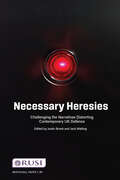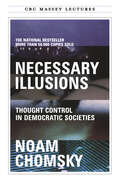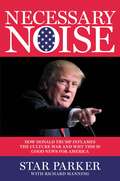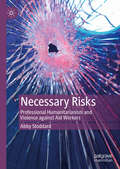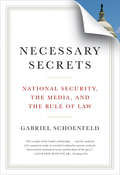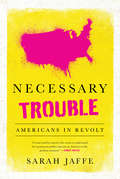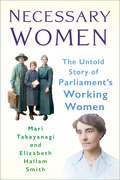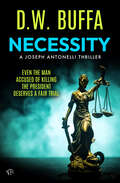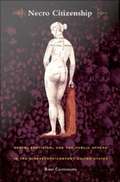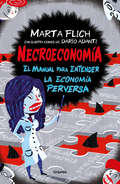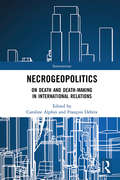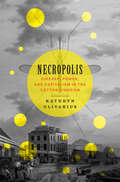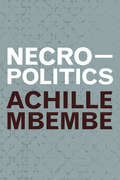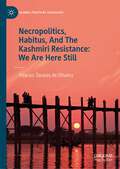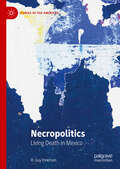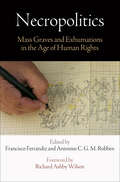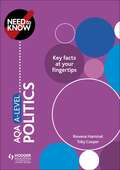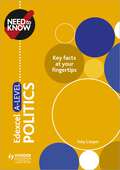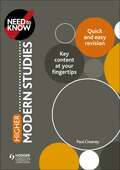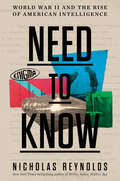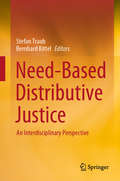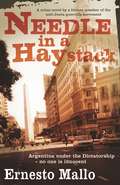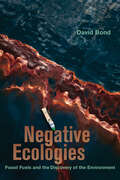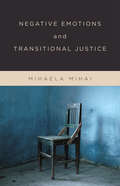- Table View
- List View
Necessary Heresies: Challenging the Narratives Distorting Contemporary UK Defence (Whitehall Papers)
by Justin Bronk Jack WatlingDominant narratives about the changing character of warfare and the revolutionary effect of technological advancement lack nuance and can ultimately be detrimental to the development of a defence capability fit for future purpose.
Necessary Illusions: Thought Control in Democratic Societies (The CBC Massey Lectures)
by Noam ChomskyIn his national bestselling 1988 CBC Massey Lectures, Noam Chomsky inquires into the nature of the media in a political system where the population cannot be disciplined by force and thus must be subjected to more subtle forms of ideological control. Specific cases are illustrated in detail, using the U.S. media primarily but also media in other societies. Chomsky considers how the media might be democratized (as part of the general problem of developing more democratic institutions) in order to offer citizens broader and more meaningful participation in social and political life.
Necessary Noise: How Donald Trump Inflames the Culture War and Why This Is Good News for America
by Star ParkerPopular FOX commentator Star Parker explains why today's noisy political rhetoric is good for you and provides specifics on why Trump's presidency is vital for America's future.Star Parker was among the many reeling and confused as Donald Trump became the 45th president of the United States. But, she argues, a silver lining to this outcome is the debate that has since ruled our media and private conversations.The ongoing noise of debate can seem overwhelming, but our country needs the authentic and candid dialogue of its people. And Trump's presidency provides us with an opportunity like never before to engage and work to preserve the values upon which America was built. Necessary Noise honestly examines the crossroads where we find ourselves and suggests ways of moving toward resolution and restoration. Tackling a wide range of topics on which citizens should get noisy--from immigration, to education, to abortion, to welfare--Necessary Noise provides the framework for how to take part in this important time in history using our voices.
Necessary Risks: Professional Humanitarianism and Violence against Aid Workers
by Abby StoddardAttacks on humanitarian aid operations are both a symptom and a weapon of modern warfare, and as armed groups increasingly target aid workers for violence, relief operations are curtailed in places where civilians are most in need. This book provides an in-depth analysis of the challenges to humanitarian action in warzones, the risk management and negotiation strategies that hold the most promise for aid organizations, and an ethical framework from which to tackle the problem. By combining rigorous research findings with structural historical analysis and first-person accounts of armed attacks on aid workers, the author proposes a reframed ethos of humanitarian professionalism, decoupled from organizational or political interests, and centered on optimizing outcomes for the people it serves.
Necessary Secrets: National Security, the Media, and the Rule of Law
by Gabriel SchoenfeldAn intensely controversial scrutiny of American democracy's fundamental tension between the competing imperatives of security and openness. "Leaking"--the unauthorized disclosure to the press of secret information--is a well-established part of the U.S. government's normal functioning. Gabriel Schoenfeld examines history and legal precedent to argue that leaks of highly classified national-security secrets have reached hitherto unthinkable extremes, with dangerous potential for post-9/11 America. He starts with the New York Times' recent decision to reveal the existence of top-secret counterterrorism programs, tipping off al Qaeda operatives to the intelligence methods designed to apprehend them. He then steps back to the Founding Fathers' intense preoccupation with secrecy in the conduct of foreign policy. Shifting to the 20th century, he scrutinizes some of the more extraordinary leaks and their consequences, from the public disclosure of the vulnerability of Japanese diplomatic codes in the years before Pearl Harbor to the publication of the Pentagon Papers in the Nixon era to the systematic exposure of undercover CIA agents by the renegade CIA agent Philip Agee. Returning to our present dilemmas, Schoenfeld discovers a growing rift between a press that sees itself as the heroic force promoting the public's "right to know" and a government that needs to safeguard information vital to the effective conduct of national defense. Schoenfeld places the tension between openness and security in the context of a broader debate about freedom of the press and its limits. With the United States still at war, Necessary Secrets is of burning contemporary interest. But it is much more than a book of the moment. Grappling with one of the most perplexing conundrums of our democratic order, it offers a masterful contribution to the enduring challenge of interpreting the First Amendment.
Necessary Trouble: Americans in Revolt
by Sarah JaffeNecessary Trouble is the definitive book on the movements that are poised to permanently remake American politics. We are witnessing a moment of unprecedented political turmoil and social activism. Over the last few years, we've seen the growth of the Tea Party, a twenty-first-century black freedom struggle with BlackLivesMatter, Occupy Wall Street, and the grassroots networks supporting presidential candidates in defiance of the traditional party elites.Sarah Jaffe leads readers into the heart of these movements, explaining what has made ordinary Americans become activists. As Jaffe argues, the financial crisis in 2008 was the spark, the moment that crystallized that something was wrong. For years, Jaffe crisscrossed the country, asking people what they were angry about, and what they were doing to take power back. She attended a people's assembly in a church gymnasium in Ferguson, Missouri; walked a picket line at an Atlanta Burger King; rode a bus from New York to Ohio with student organizers; and went door-to-door in Queens days after Hurricane Sandy.From the successful fight for a 15 minimum wage in Seattle and New York to the halting of Shell's Arctic drilling program, Americans are discovering the effectiveness of making good, necessary trouble. Regardless of political alignment, they are boldly challenging who wields power in this country.
Necessary Women: The Untold Story of Parliament’s Working Women
by Mari Takayanagi Elizabeth Hallam SmithDrawing on unique research based on the Parliamentary archives, government records and family history sources, Mari Takayanagi and Elizabeth Hallam Smith show how women touched just about every aspect of the life of Parliament, largely unacknowledged - until now. Along the way, we meet an array of impressive and life-affirming women: from the Rickman sisters eavesdropping on Parliamentary debates from the roof space above the Commons in the 1820s; to Jane, the doyenne of Bellamy's, purveyors of tea, chops, steaks, pies and wine to MPs in the 1840s; and to Jean Winder, the first female Hansard reporter, who fought for years after being appointed in 1944 to be paid the same as her male counterparts. As historians and Parliamentary insiders themselves, Takayanagi and Hallam Smith bring these unsung heroes to life, charting along the way the changing context for working women within and beyond the Palace of Westminster.
Necessity (The Joseph Antonelli Thrillers)
by D. W. BuffaA defense attorney faces the toughest case of his career: representing a man who has admitted to murdering the president . . . When Joseph Antonelli, who has never lost a case, takes on the most shocking client of his career, he is unprepared for the depths of trouble he&’s about to get into. A senator has confessed to stabbing the president of the United States to death—but has invoked the &“Law of Necessity,&” which states that a crime is justified if it serves the greater good. As the nation is gripped by the trial of the century, Antonelli must try a case with all eyes on him—and his own life on the line—in this riveting read from a bestselling Edgar Award nominee. &“Highly recommended for lovers of legal and political thrillers.&” ―Library Journal (starred review)Praise for D. W. Buffa &“Buffa is one of a kind.&” —San Jose Mercury News &“A whopper of a reveal.&” —Booklist
Necro Citizenship: Death, Eroticism, and the Public Sphere in the Nineteenth-century United States
by Russ CastronovoIn Necro Citizenship Russ Castronovo argues that the meaning of citizenship in the United States during the nineteenth century was bound to--and even dependent on--death. Deploying an impressive range of literary and cultural texts, Castronovo interrogates an American public sphere that fetishized death as a crucial point of political identification. This morbid politics idealized disembodiment over embodiment, spiritual conditions over material ones, amnesia over history, and passivity over engagement. Moving from medical engravings, séances, and clairvoyant communication to Supreme Court decisions, popular literature, and physiological tracts, Necro Citizenship explores how rituals of inclusion and belonging have generated alienation and dispossession. Castronovo contends that citizenship does violence to bodies, especially those of blacks, women, and workers. "Necro ideology," he argues, supplied citizens with the means to think about slavery, economic powerlessness, or social injustice as eternal questions, beyond the scope of politics or critique. By obsessing on sleepwalkers, drowned women, and other corpses, necro ideology fostered a collective demand for an abstract even antidemocratic sense of freedom. Examining issues involving the occult, white sexuality, ghosts, and suicide in conjunction with readings of Harriet Jacobs, Ralph Waldo Emerson, Frederick Douglass, Nathaniel Hawthorne, and Frances Harper, Necro Citizenship successfully demonstrates why Patrick Henry's "give me liberty or give me death" has resonated so strongly in the American imagination.
Necroeconomía: El manual para entender la economía perversa
by Marta Flich Dario AdantiMarta Flich, «la musa de la izquierda», repasa desde la ironía y el humor las claves para entender, de una vez por todas, cómo funciona la economía. Si te inquietan el gasto social y la corrupción, si te preguntas a menudo por qué sigues siendo pobre aunque trabajes ocho horas al día, o si tienes ganas de saber más de economía pero esta te parece oscura e inaccesible, este es tu libro. Marta Flich nos acerca la realidad económica para hacernos entender, por fin, los conceptos básicos que la rigen con su característico estilo irónico y mordaz. Con esta guía cualquiera podrá entender los principios elementales de la economía mundial con ejemplos del día a día que resultan cómicos y cotidianos. Es un manual que está pensado para perderle el miedo a esa información que, a veces, nos supera, y para ayudarnos a comprender a dónde van nuestros impuestos y qué papel jugamos en la sociedad, más allá de los cantos de sirena de los políticos. Y, sobre todo, Marta denuncia que hablar de economía en España es hablar hoy más que nunca de la expansión de la «necroeconomía», esa maquinaria perversa diseñada para que siempre pierda el más débil. Todo ello acompañado de las ilustraciones de Darío Adanti, renovador del cómic español y referente del humor satírico. ¿Qué es la necroeconomía? Para mí, es toda aquella utilización mercantilista y transversal que afecta a un grupo vulnerable por falta de igualdad de oportunidades. La necroeconomía no hubiera crecido tan salvajemente sin la existencia de la comunicación, principalmente a través de las redes sociales. ¿Sigues sin entenderlo? Bien, hagamos un ejercicio pedagógico acelerado. Para mí, no digo que necesariamente tenga que ser lo mismo para el resto de mis colegas, la necroeconomía es una de esas formas que adopta la economía y que, en la actualidad, está avanzando geométricamente, haciéndose un hueco en nuestros podridos corazones. La necroeconomía es todo aquello que se rentabiliza a partir del dolor, la muerte, la injusticia, la desgracia o todo a la vez. ¿Vendes camisetas con un lema feminista para sacar pasta cuando en realidad te es indiferente la igualdad? Necroeconomía. ¿Exprimes a personas con un trauma reciente rentabilizando su causa hasta agotar el interés (y la recaudación)? Necroeconomía. ¿Tergiversas la verdad para ganar dinero? Necroeconomía. ¿Montas actos donde la gente aporta pasta para luchar contra el terrorismo o el cáncer, pero nadie recibe esa ayuda salvo tu bolsillo? Necroeconomía. ¿Vas a una fundación y te dejan las joyas para que poses en un photocall? Necroeconomía. ¿Participas en actos solidarios pero tú vas a que te inviten a cenar y hacer contactos con el marqués de Bliblibli? Eres mala gente. Pero, en cualquier caso, enhorabuena, formas parte del circo.
Necrogeopolitics: On Death and Death-Making in International Relations (Interventions)
by Caroline Alphin François DebrixNecrogeopolitics: On Death and Death-Making in International Relations brings together a diverse array of critical IR scholars, political theorists, critical security studies researchers, and critical geographers to provide a series of interventions on the topic of death and death-making in global politics. Contrary to most existing scholarship, this volume does not place the emphasis on traditional sources or large-scale configurations of power/force leading to death in IR. Instead, it details, theorizes, and challenges more mundane, perhaps banal, and often ordinary modalities of violence perpetrated against human lives and bodies, and often contributing to horrific instances of death and destruction. Concepts such as "slow death," "soft killing," "superfluous bodies," or "extra/ordinary" destruction/disappearance are brought to the fore by prominent voices in these fields alongside more junior creative thinkers to rethink the politics of life and death in the global polity away from dominant IR or political theory paradigms about power, force, and violence. The volume features chapters that offer thought-provoking reconsiderations of key concepts, theories, and practices about death and death-making along with other chapters that seek to challenge some of these concepts, theories, or practices in settings that include the Palestinian territories, Brazilian cities, displaced population flows from the Middle East, sites of immigration policing in North America, and spaces of welfare politics in Scandinavian states.
Necropolis: Disease, Power, and Capitalism in the Cotton Kingdom
by Kathryn OlivariusDisease is thought to be a great leveler of humanity, but in antebellum New Orleans acquiring immunity from the scourge of yellow fever magnified the brutal inequities of slave-powered capitalism. Antebellum New Orleans sat at the heart of America’s slave and cotton kingdoms. It was also where yellow fever epidemics killed as many as 150,000 people during the nineteenth century. With little understanding of mosquito-borne viruses—and meager public health infrastructure—a person’s only protection against the scourge was to “get acclimated” by surviving the disease. About half of those who contracted yellow fever died. Repeated epidemics bolstered New Orleans’s strict racial hierarchy by introducing another hierarchy, what Kathryn Olivarius terms “immunocapital.” As this highly original analysis shows, white survivors could leverage their immunity as evidence that they had paid their biological dues and could then pursue economic and political advancement. For enslaved Blacks, the story was different. Immunity protected them from yellow fever, but as embodied capital, they saw the social and monetary value of their acclimation accrue to their white owners. Whereas immunity conferred opportunity and privilege on whites, it relegated enslaved people to the most grueling labor. The question of good health—who has it, who doesn’t, and why—is always in part political. Necropolis shows how powerful nineteenth-century white Orleanians—all allegedly immune—pushed this politics to the extreme. They constructed a society that capitalized mortal risk and equated perceived immunity with creditworthiness and reliability. Instead of trying to curb yellow fever through sanitation or quarantines, immune white Orleanians took advantage of the chaos disease caused. Immunological discrimination therefore became one more form of bias in a society premised on inequality, one more channel by which capital disciplined and divided the population.
Necropolitics (Theory in Forms)
by Achille MbembeIn Necropolitics Achille Mbembe, a leader in the new wave of francophone critical theory, theorizes the genealogy of the contemporary world, a world plagued by ever-increasing inequality, militarization, enmity, and terror as well as by a resurgence of racist, fascist, and nationalist forces determined to exclude and kill. He outlines how democracy has begun to embrace its dark side---what he calls its &“nocturnal body&”---which is based on the desires, fears, affects, relations, and violence that drove colonialism. This shift has hollowed out democracy, thereby eroding the very values, rights, and freedoms liberal democracy routinely celebrates. As a result, war has become the sacrament of our times in a conception of sovereignty that operates by annihilating all those considered enemies of the state. Despite his dire diagnosis, Mbembe draws on post-Foucauldian debates on biopolitics, war, and race as well as Fanon's notion of care as a shared vulnerability to explore how new conceptions of the human that transcend humanism might come to pass. These new conceptions would allow us to encounter the Other not as a thing to exclude but as a person with whom to build a more just world.
Necropolitics, Habitus, And The Kashmiri Resistance: We Are Here Still (Global Political Sociology)
by Vinícius Tavares de OliveiraThis book engages the concept of necropolitics to present a vision of how to understand the physical body as a space of power and resistance to social order, in the context of the Kashmir resistance. The author sheds new light on the relations between India and Pakistan, with a focus on tensions over the Kashmir region, in order to better understand the emergence and stabilization of the narrative that criminalizes and thus justifies the population that rebels against state actions in the region. The research draws from archival and interview research and presents the reader with new insight into both conceptual and material dimensions of necropolitics.
Necropolitics: Living Death in Mexico (Studies of the Americas)
by R. Guy EmersonThis book offers a contemporary look at violence in Mexico and argues for a recalibration in how necropolitics, as the administration of life and death, is understood. The author locates the forces of mortality directly on the body, rather than as an object of government, thereby placing death in a politics of the everyday. This necropolitics is explored through testimonies of individuals living in towns overrun by organized crime and resistance groups, namely, the autodefensa movement, that operate throughout Michoacán, one of the most violent states in Mexico. This volume studies how individuals and communities go on living not in spite of the death that surrounds life, but more disturbingly by attuning to it.
Necropolitics: Mass Graves and Exhumations in the Age of Human Rights (Pennsylvania Studies in Human Rights)
by Richard Ashby Wilson Antonius C. Robben Francisco FerrándizThe unmarked mass graves left by war and acts of terror are lasting traces of violence in communities traumatized by fear, conflict, and unfinished mourning. Like silent testimonies to the wounds of history, these graves continue to inflict harm on communities and families that wish to bury or memorialize their lost kin. Changing political circumstances can reveal the location of mass graves or facilitate their exhumation, but the challenge of identifying and recovering the dead is only the beginning of a complex process that brings the rights and wishes of a bereaved society onto a transnational stage.Necropolitics: Mass Graves and Exhumations in the Age of Human Rights examines the political and social implications of this sensitive undertaking in specific local and national contexts. International forensic methods, local-level claims, national political developments, and transnational human rights discourse converge in detailed case studies from the United States, Argentina, Chile, Peru, Spain, Bosnia-Herzegovina, Greece, Rwanda, Cambodia, and Korea. Contributors analyze the role of exhumations in transitional justice from the steps of interviewing eyewitnesses and survivors to the painstaking forensic recovery and comparison of DNA profiles. This innovative volume demonstrates that contemporary exhumations are as much a source of personal, historical, and criminal evidence as instruments of redress for victims through legal accountability and memory politics.Contributors: Zoë Crossland, Francisco Ferrándiz, Luis Fondebrider, Iosif Kovras, Heonik Kwon, Isaias Rojas-Perez, Antonius C. G. M. Robben, Elena Lesley, Katerina Stefatos, Francesc Torres, Sarah Wagner, Richard Ashby Wilson.
Need to Know: AQA A-level Politics
by Toby Cooper Rowena HammalKey facts at your fingertips:- Check key content when you need it- Review your understanding- Use quick tips for success- Improve your exam performance- Dip in for support throughout your courseFind what you need to know for AQA A-level Politics when you need it. Written by experienced authors Rowena Hammal and Toby Cooper, this guide will help you to:- Build on your learning throughout the course by reinforcing the key facts, terms and concepts from the specification- Put what you learn into context with topic links and exam tips specific to Higher (subject)- Revise with confidence using the 'Do you know' questions at the end of each topic and synoptic questions at the end of each section. Answers are online at www.hoddereducation.co.uk/needtoknow/answers
Need to Know: Edexcel A-level Politics
by Toby CooperExam board: EdexcelLevel: A-levelSubject: PoliticsFirst teaching: September 2017First exams: Summer 2018 (AS); Summer 2019 (A-level)Covering what you really need to know for Edexcel A-level Politics - in just 120 pages, this revision guide makes revision easy - whether you're getting started early or you need to do some last-minute cramming.- Find key facts at your fingertips with quick summaries of the content, concepts and terms from the Edexcel A-level Politics specification- Get better grades in your exams with tips on exam technique, mistakes to avoid and important things to remember- Revise and practise using end-of-topic questions and in-depth synoptic questions at the end of each section- Benefit from the knowledge of experienced author Toby Cooper
Need to Know: Edexcel A-level Politics Epub
by Toby CooperExam board: EdexcelLevel: A-levelSubject: PoliticsFirst teaching: September 2017First exams: Summer 2018 (AS); Summer 2019 (A-level)Find what you need to know, when you need it, with key facts at your fingertips for Edexcel A-level Politics. Keep this course companion by your side throughout your A-levels so you can check content, review your understanding, use quick tips for success and improve your exam performance.Written by an experienced teacher, author and examiner, this book will help you to:- Build on your learning throughout the course by reinforcing the key facts, terms and concepts from the Edexcel A-level Politics specification- Put the content into context with synoptic links between topics and exam tips on technique, mistakes to avoid and things to remember- Revise with confidence using 'Do you know?' questions at the end of each topic and synoptic questions at the end of each sectionThis book covers what you need to know for UK and US politics and political systems, as well as political ideologies.
Need to Know: Higher Modern Studies
by Paul CreaneyExam board: SQALevel: HigherSubject: Modern StudiesFirst teaching: September 2018 First exams: Summer 2019 What do you really need to know for the SQA Higher Modern Studies exam?This revision guide covers the essentials in just 112 pages, so it's perfect for early exam preparation or last-minute revision.- Find key content at your fingertips with quick summaries of the issues, processes and terminology that you need to understand- Get a better grade in your exam with tips on exam technique, mistakes to avoid and important things to remember- Revise and practise using end-of-topic questions and synoptic questions at the end of each section - with answers provided online- Benefit from the knowledge of experienced teacher Paul CreaneyThis book covers the following content:- Democracy in Scotland and the UK: All topics- Social Issues in the UK: Social Inequality and Crime and the Law- International Issues: Terrorism (World Powers) and The Development of Africa (World Issues)
Need to Know: World War II and the Rise of American Intelligence
by Nicholas ReynoldsOne of The New Yorker's "Best Books of the Year" * A Gilder Lehrman Military History Prize Finalist"Authoritative. . . . [Reynolds's] contribution to our understanding of the rise of American intelligence is unparalleled." —Journal of Intelligence History“The most thorough and detailed history available on the origins of U.S. intelligence.” —Michael Morell, former Deputy Director and Acting Director, CIAHistorian and former CIA officer Nicholas Reynolds, the New York Times bestselling author of Writer, Sailor, Soldier, Spy, uncovers the definitive history of American intelligence during World War II, illuminating its key role in securing victory and its astonishing growth from practically nothing at the start of the war. The entire vast, modern American intelligence system—the amalgam of three-letter spy services of many stripes—can be traced back to the dire straits the world faced at the dawn of World War II. Prior to 1940, the United States had no organization to recruit spies and steal secrets or launch covert campaigns against enemies overseas and just a few codebreakers, isolated in windowless vaults. It was only through Winston Churchill’s determination to mobilize the US in the fight against Hitler that the first American spy service was born, built from scratch against the background of the Second World War.In Need to Know, Nicholas Reynolds explores the birth, infancy, and adolescence of modern American intelligence. In this first-ever look across the entirety of the war effort, Reynolds combines little-known history and gripping spy stories to analyze the origins of American codebreakers and spies as well as their contributions to Allied victory, revealing how they laid the foundation for the Cold War—and beyond.
Need-Based Distributive Justice: An Interdisciplinary Perspective
by Bernhard Kittel Stefan TraubThis book explores the foundations and potential of a theory of need-based distributive justice, supported by experimental evidence. The core idea is that need-based distributive justice may have some legitimatory advantages over other important principles of distribution, like equality and equity, and therefore involves less dispute over the distribution and redistribution of scarce resources.In seven chapters, eleven scholars from the fields of philosophy, psychology, sociology, political science and economics outline the normative and positive building blocks of such a theory by critically reviewing the literature on distributive justice from their respective disciplinary perspectives. They address important theoretical and practical issues concerning the rationality of needs identification at the individual level and the recognition of needs at the societal level. They also investigate whether and how the dynamics of distribution procedures that allocate resources according to the need principle leads to social stability, focusing on the economic incentives that arise from need-based redistribution. The final chapter provides a synthesis and outlines a framework for a theory of justice based on ten hypotheses derived from the insights presented.
Needle in a Haystack
by Jethro Soutar Ernesto Mallo"This is not simply a triumph of style; it is both a reflection on a time of bloodshed and a raw vision of human misery."-Guillermo Saccomanno, winner of the Argentine National Literature Prize"This man knows. He knows about guns, knows about women, knows about dead bodies. . . . But above all he knows how to narrate."-Ana María Shua, author of El peso de la tentaciónSuperintendent Lascano is a detective working under the shadow of military rule in Buenos Aires in the late 1970s. Sent to investigate a double murder, he arrives at the crime scene to find three bodies. Two are clearly the work of the Junta's death squads, murders he is forced to ignore; the other one seems different.The trail leads Lascano through a decadent Argentina, a country poisoned to its core by the tyranny of the regime. The third corpse turns out to be that of Biterman, moneylender and Auschwitz survivor. When Lascano digs too deep, he must confront Giribaldi, an army major, quick to help old friends but ruthless in dealing with dissenters such as Eva, the young militant with whom Lascano is falling in love.Born in 1948, Ernesto Mallo is a published essayist, newspaper columnist, screenwriter, and playwright. He is a former anti-Junta militant who was pursued by the dictatorship. Needle in a Hay Stack is his first novel and the first in a trilogy with superintendent Lascano. The first two are being made into films.
Negative Ecologies: Fossil Fuels and the Discovery of the Environment
by David BondSo much of what we know of clean water, clean air, and now a stable climate rests on how fossil fuels first disrupted them. Negative Ecologies is a bold reappraisal of the outsized role fossil fuels have played in making the environment visible, factual, and politically operable in North America. Following stories of hydrocarbon harm that lay the groundwork for environmental science and policy, this book brings into clear focus the dialectic between the negative ecologies of fossil fuels and the ongoing discovery of the environment. Exploring iconic sites of the oil economy, ranging from leaky Caribbean refineries to deepwater oil spills, from the petrochemical fallout of plastics manufacturing to the extractive frontiers of Canada, Negative Ecologies documents the upheavals, injuries, and disasters that have long accompanied fossil fuels and the manner in which our solutions have often been less about confronting the cause than managing the effects. This history of our present promises to re-situate scholarly understandings of fossil fuels and renovate environmental critique today. David Bond challenges us to consider what forms of critical engagement may now be needed to both confront the deleterious properties of fossil fuels and envision ways of living beyond them.
Negative Emotions and Transitional Justice
by Mihaela MihaiVehement resentment and indignation are pervasive in societies emerging from dictatorship or civil conflict. How can institutions channel these emotions without undermining the prospects for democracy? Emphasizing the need to recognize and constructively engage negative public emotions, Mihaela Mihai contributes theoretically and practically to the growing field of transitional justice. Drawing on an extensive philosophical literature and case studies of democratic transitions in South Africa, South America, and Eastern Europe, her book rescues negative emotions from their bad reputation and highlights the obstacles and the opportunities such emotions create for democracy. By valorizing negative emotions, either through the judicial review of transitional justice bills or the criminal trials of victimizers, institutions realize the value of respect and concern for all while contributing to a culture that is hospitable to democracy.
